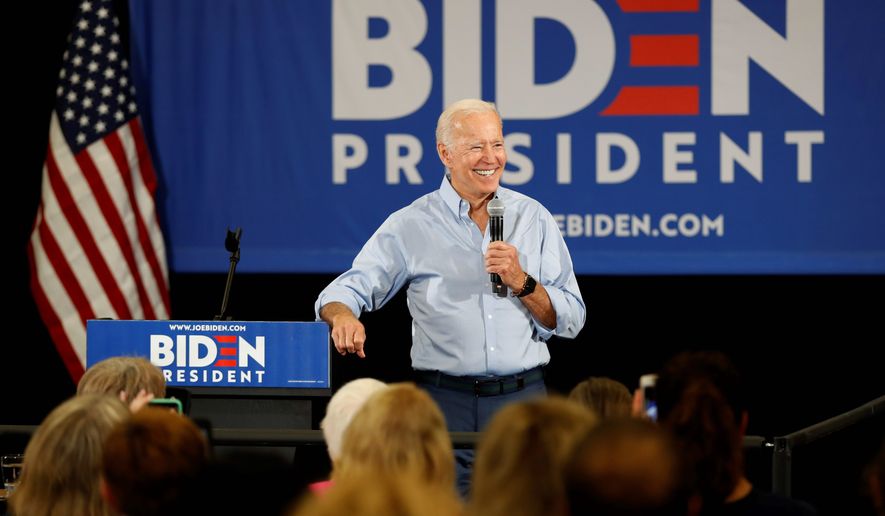Former Vice President Joseph R. Biden has two major selling points to Democrats — his professed ability to strike bipartisan deals and his eight years as President Barack Obama’s sidekick, who is still immensely popular.
Those two arguments are becoming hard to reconcile.
Mr. Biden has distanced himself from much of his work as a senator, calling himself a bystander on the most contentious parts of the 1994 crime bill, disavowing his vote for the Iraq War and finding reasons to break from his past voting record on social issues such as abortion.
At the same time, the Obama years that Mr. Biden likes to recall on the campaign trail were remarkably void of bipartisan deals. The deals that were struck and bear Mr. Biden’s fingerprints — such as the fiscal cliff deal negotiated with Senate Majority Leader Mitch McConnell in 2013 — are not particularly attractive to a Democratic left wing eager for a confrontation with Mr. McConnell.
Team Biden quickly turns on Mr. McConnell when questioned about the bipartisan record of the Obama White House.
“A lot of that was Mitch McConnell — one person. He declared as soon as Obama took office that he was committed to making him a one-term president,” said Jon Cooper, a major Democratic bundler allied with the Biden campaign.
Despite the partisan gridlock that prompted Mr. Obama to rely on executive orders, Mr. Cooper said it was a more bipartisan environment than under President Trump.
“There are a lot of Republicans who are currently afraid to work with Democrats but would be willing to do so in a post-Trump era. It’s not going to be all sunshine and rainbows, but it will be better,” he said.
Mr. Biden has said he wins over Republicans by “shaming people” or with a political version of a “brass knuckle fight.”
The bipartisan talk drew fire not only from the party’s far left, which considers him a political relic, but also from some former Obama operatives.
“Maybe you can shame people. you can’t shame McConnell. it would be dope to find a path to greater bipartisanship but this isn’t that path,” tweeted Alyssa Mastromonaco, a former Obama White House deputy chief of staff.
Ms. Mastromonaco has criticized other Democrats, including calling the left “a hot mess,” but her jab at Mr. Biden underscores the delicate path he is navigating.
Sen. Bernard Sanders of Vermont, a socialist seeking the Democratic presidential nomination, took a swipe at Mr. Biden’s approach when he warned the California Democratic Party convention against seeking “middle ground” on climate change, gun control, abortion, health care and corporate power.
“We cannot go back to the old ways, we have got to go forward with a new and progressive agenda,” said Mr. Sanders, who ranked as the most partisan senator in an analysis by the Lugar Center and Georgetown University.
On the stump, Mr. Biden carefully avoids talk of his deal-making with Mr. McConnell, instead highlighting the 2009 economic stimulus package aimed at the Great Recession. The bill, known as the Recovery Act, passed the Senate with the help of three moderate Republicans who reliably cross the aisle.
“Sometimes you have to have a bare-knuckled fight like we did on health care. We won without a single Republican vote. Other times [like] to try and save the economy, I went out and I convinced three Republicans,” Mr. Biden said recently in Iowa.
He added, “They changed, not because of me, because I didn’t attack them personally and I made sure in fact that they understood what was at stake.”
The bipartisan pitch is more compelling in a general election when candidates are seeking crossover voters. In a primary, however, it usually would be expected to turn off a party’s base voters rearing for a fight.
Patrick Murray, director of the Monmouth Polling Institute, said the environment of the 2020 Democratic race could turn that conventional wisdom on its head.
“With so many candidates splitting the anti-Trump vote it might be a winning formula,” he said. “There is a qualitative difference between saying ‘I am all for bipartisanship’ and saying ‘I am the one who gets Republicans to work with us.’ It is a subtle difference but it makes a big difference in this Democratic primary environment.”
• Seth McLaughlin can be reached at smclaughlin@washingtontimes.com.
• S.A. Miller can be reached at smiller@washingtontimes.com.




Please read our comment policy before commenting.